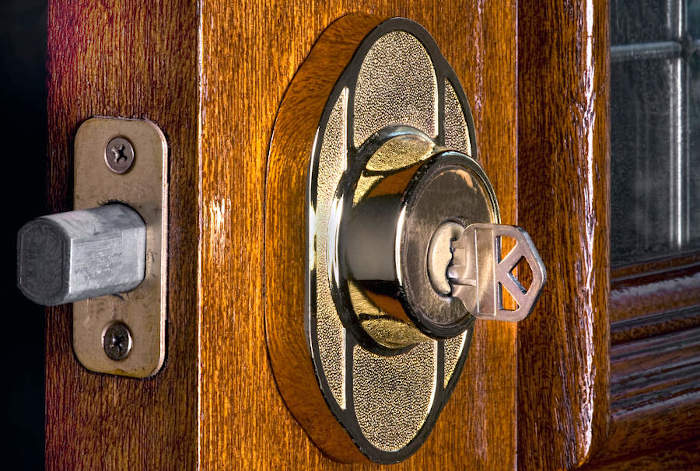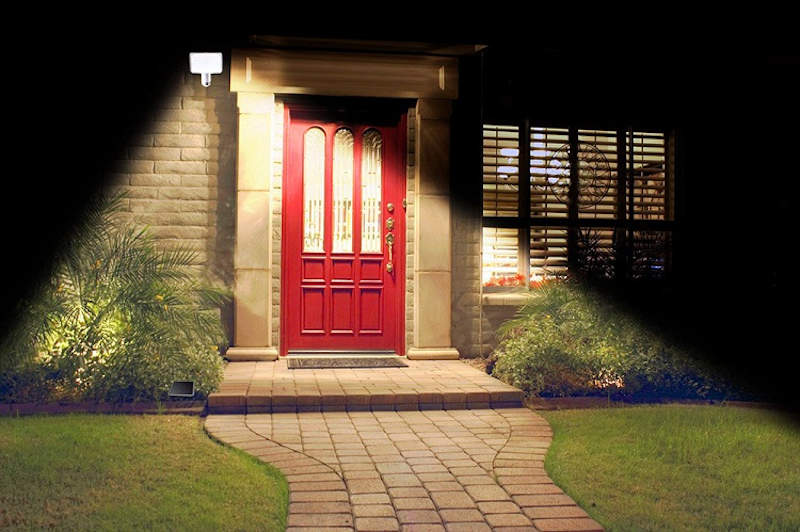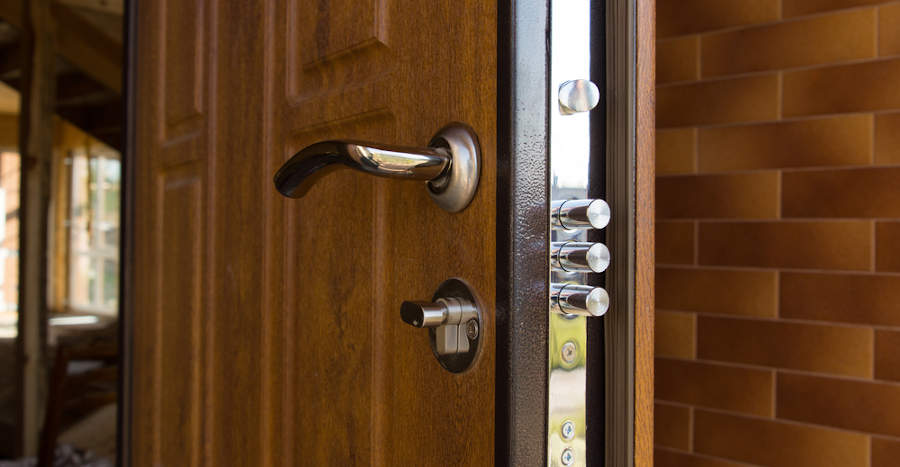
Deadbolt locks & Nashville home security
Role of the deadbolt lock in Nashville home security
There are many actions the Nashville homeowner can take to improve home security: installing an alarm system, improving the exterior lighting, implementing motion sensors, replacing the mailbox with a mail slot, and much more.
But according to locksmiths, even if you have done all those things except secure your front door properly, then your home isn’t very secure at all.
Did you know that at least 34% of burglars gain entry to the home by kicking in the front door? That’s right: Over one-third of burglar, access is right through a locked – and often deadbolted & chained – front door!
In the movies, you see front doors getting kicked in all the time. It’s standard Hollywood fare. The problem is, most Nashville homeowners are simply unaware that the most typical, common front door and related door hardware is really not very secure at all – and there’s a good chance your home has a standard setup. (It’s one of many shortcuts used by some homebuilders to keep costs down.)
You could have top-of-the-line deadbolt locks on all your entry doors – but if the surrounding, related door hardware and materials are average, then the deadbolt-locked door can be kicked in with surprising ease. Please don’t make the mistake of overlooking relatively inexpensive but high-quality door hardware.
But isn’t it difficult to kick in a deadbolted front door?
Unless you have done your homework (congratulations – you’re doing part of your homework by reading this article right now), you probably think kicking in your deadbolted front door is not all that easy to do. After all, there’s no apparent reason your front door and other entry doors would be weaker or less secure than average. You probably have about the same front door materials and hardware as the other houses nearby; it’s a common assumption, especially in subdivisions. And you might be correct in that assumption: that your front door hardware is standard in that it meets the minimum requirements for the industry, just like nearby houses.
The problem is, standard front door hardware is not secure! Sad but true: It really is about as easy to kick in a deadbolted, chained front door as it looks to be in the movies.
Sidenote: For those with an interest in the law, there are three elements required in order for a property crime to be legally considered a burglary:
(1) Unauthorized entry…
(2) Into a structure…
(3) With an intent to commit a crime.
A common misconception is that a burglary must include breaking and entering. This is not true; the burglar need only enter; (s)he doesn’t have to break in.
Intruders often gain entry by kicking in the front (or other entry) door – and because the locks, deadbolts, and/or the surrounding hardware and materials are cheap or not working properly, the intruder is able to kick the door in.
Your front door might have a brand-new deadbolt – a good brand (like Schlage or Kwikset) with a lock that goes more than three inches into the wall. But it isn’t the length of the deadbolt that makes it secure. It’s the surrounding material – often just a bit of wood and drywall – and thus a complete cinch to kick in. There are other cases where the door’s hinges are the real weak spot. When the criminal repeatedly kicks the door attempting to get through the locked deadbolt, it is the hinges on the opposite side that break loose from the door jamb.
We specialize in securing entry doors for our valued residential and commercial clients – and just about anything else our Nashville-area clients may need in terms of home remodeling or renovation. It’s no surprise that many people know us as their Green Hills handyman!
We enjoy our work – and we’re quite good at it. Part of our job as Nashville remodelers, handymen, and home security specialists is to make it extremely difficult for your entry doors to be kicked in by criminals. Would you like to sleep more and worry less? Take some simple and affordable steps to secure your entry door against kick-ins. Call Broderick Builders, your Physical Home Security specialists, today at 615.385.3210 – or use our quick and easy contact form.
From start to finish, we’ll do everything we can to make securing your home as pleasant an experience as possible – and we guarantee your satisfaction with the result of our physical home security work.
We’ve been installing secure entry doors for more than 40 years, so we know the ins and outs. Let us help you improve your home security.
A deadbolt is a type of lock with a steel bolt that extends into the door jamb and strike plate of a door frame. As we mentioned earlier, many folks incorrectly assume that the further into the wall your deadbolt goes, the harder it is to break in. Not true.
Regular locks can be quickly broken with a tool like a crowbar or with tactics like lock bumping or picking locks. A deadbolt lock is almost impossible to defeat using such tricks. Deadbolts require a much longer time to break due to their physical strength and density, and this makes an intruder less likely to keep trying to break in. In short, the more difficult you make it to break into your home, the more likely an intruder will be to cut his or her losses and move on to an easier target
Types of deadbolts
Single-cylinder deadbolt
The most common type of deadbolt lock is the single-cylinder deadbolt; these use a twist knob on the inside of the door and of course, require a key on the outside.
Of great importance is how much glass your entry door has and whether that glass if broken would allow the would-be criminal to reach in to open the lock. A single-cylinder deadbolt can be breached if an entry door has glass panels within easy reach of the lock because a burglar can break the glass and reach inside to unlatch the deadbolt.
Double-cylinder deadbolt
Some Nashville homeowners – myself included – prefer the double-cylinder deadbolt, which requires a key for both inside and outside. It’s less convenient but more secure. The double-cylinder deadbolt can be problematic in the event of a fire since a key is required to unlock the door from the inside; see cautionary note below.
One of the main advantages of double-cylinder deadbolts: a burglar can reach in but can’t open it from the inside without the key.
Double cylinder deadbolts offer more security than single cylinder deadbolts when they are used to lock doors that have glass windows or doors that are positioned near a window. This is because an intruder can easily break the glass and reach in and unlock a single deadbolt lock. Since a double deadbolt requires a key to unlock both the exterior and interior of the lock, it is more secure.
A cautionary note for keeping your family safe is necessary here. A double deadbolt may create a serious problem in an emergency should the key not be readily available, like during a fire when a quick exit is necessary. Therefore, if you have a double cylinder deadbolt, make sure the inside key is kept nearby and confirm that everyone in your home knows its exact location.
Remember that the key should not be left in the lock or be visible through the window; this would negate any benefit of the double-cylinder deadbolt, as the crafty intruder could break a window, reach the key, and unlock the door.
Replacing the door
Depending on your circumstances, the best option may be to replace the door itself. These days, many exterior doors are designed with improved security in mind. Some use reinforced glass or small windows far enough away from the lock to prevent a burglar from reaching in.
We’ll discuss more on door replacement in an upcoming home security article.
How a deadbolt lock works
A hardened steel deadbolt lock is one of the most effective and widely available deadbolt solutions available, and we are ready to install them for you at your convenience. Essentially, the deadbolt sticks fully inside a hole in the doorjamb, which is secured by a metal striking plate, screwed to the door frame studs.
name
Locksmiths Say Deadbolt Key To Home Security – Angie’s List
Theft, robbery, burglary… what’s the difference?
Theft, aka larceny, is the act of taking someone else’s property, intending to keep it without owner consent.
Robbery is the act of taking something from another by using force or the threat of force.
Burglary differs from theft & robbery… it is not necessary for something to have been taken, only that intent was there.
Burglary by degree
First-degree burglary: Entering someone’s home with the intent to commit theft or violence; a felony charge.
Second-degree burglary: Often includes the same elements as first-degree burglary with the exception that it applies to entering a commercial building or place of business; may also apply when the perpetrator entered a building with the intent to commit arson or steal a firearm; a felony charge.
Third-degree burglary: Entering any structure with the intent to commit any crime other than theft, violence, or arson, may be considered third-degree burglary; a felony charge in some places.
Fourth-degree burglary: While some states do not use fourth-degree burglary, others charge an individual with fourth-degree burglary for simply breaking and entering; a misdemeanor charge.
Resources: Deadbolt lock in Nashville home security
- Best and Worst Door Locks – Consumer Reports
- Locksmiths Say Deadbolt Key to Home Security | Angie’s List
- How to Reinforce Doors: Entry Door and Lock Reinforcements | Family Handyman
- The Ultimate Guide to Reinforcing Your Doors
- Deadbolts :: Door Locks :: Security Snobs
- 2020’s Best Door Locks for Security | ASecureLife.com
- The Best Lock For Your Home: Is Your Lock Really Safe? – 4 Houses a Minute: The Home Security Blog
- Home Security (Residential Door Security – Deadbolt Locks – Lock Bumping – Drill Attack) – YouTube
- 2019 Deadbolt – Tutorial & Installation for Deadbolt Lock: The Ultimate Lock, Schlage and more – YouTube
- Door Locks, Door Hardware, Smart Locks & Smartkey Technology | Kwikset
- Guest Post – What Makes A Great Deadbolt Lock | Wireless Security System
- The Best Keyless Smart Door Locks of 2020 | SafeWise
- Best Door Lock – Shopping Guide – Bob Vila
- Dead bolt – Wikipedia
- Deadbolt Secure – Home
- Understanding CSS Grid: Grid Template Areas — Smashing Magazine






